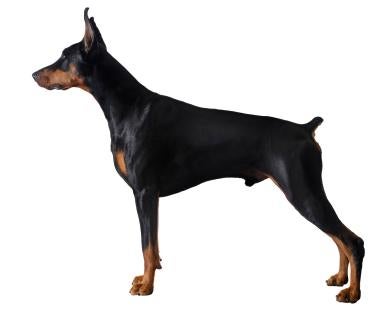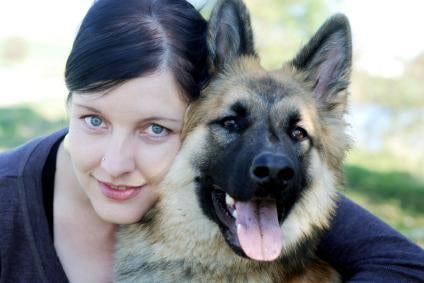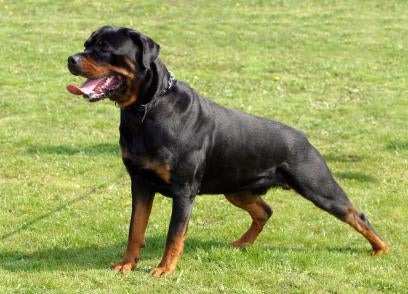Guard Dog Training & Selection
Discover how to Select, Raise and Train the ideal Family Watch Dog, Protection Dog or Schutzhund Training Companion
The public perception of what a guard dog is generally conjures up images of snarling, lunging, foreboding creatures. How realistic this image is varies greatly, as do the reasons why people seek out guard dogs.
There's plenty of valid reasons why you may want a guard or protection dog in your household. A well trained guard dog is a valuable family member who will work hard to protect his/her housemates and possessions. Bringing a guard dog into your home does come with a whole lot of extra responsibility though.

What Makes A Good Guard Dog?
A guard dog, loosely defined, is one that protects property and family (sometimes called family watch dogs or protection dogs). There is the quintessential 'junk yard' dog whose only purpose is to scare off would-be intruders. This type of guard dog receives little if any training and interaction.Guard dogs can be much more sophisticated than that, and dogs with highly specialized training are readily available for purchase. The more fine tuned training generally involves special commands for protection of personal body (more on Schutzhund training later).
On the lowest level a guard dog simply functions as a watch dog or alert barker - which is all most people will ever need. On the highest level, he functions as a well oiled, highly trained machine capable of defending himself and others without hesitation.
What Are The Best Guard Dog Breeds?
There is a lot of misunderstanding about what kind of dog makes a good guard dog. In reality, what the best breeds are really depends on what someone is looking for.For example, if a person just really wants a dog that will alert bark and keep on eye on people coming and going, then there are a whole range of breeds that can capably handle this general "watch dog" type role. Many terriers are excellent alert barkers, although the majority will not follow through with biting. Herding breeds are also often excellent alert barkers, and quite a few of them will back up the barking with protection of the family or property.
Herding breeds make such excellent watch dogs because by instinct they are accustomed to protecting a flock of sheep, and it is essential that they take notice of any change in the flock or any strangers nearby. For this reason, many of the breeds in this group do a top notch job of alert barking. Guardian herding breeds like Great Pyrenees, Anatolian Shepherds, and Komondors are much more likely to not only bark, but to be wary of any strangers. If the need arises, they will also protect.
Other breeds of dogs that have the potential to be good guard dogs are dogs in the Mastiff family. Many of these dogs are gentle giants with the family, but they also make determined watch dogs and protection animals.
Some breeds like Presa Canarios and Pit Bulls are also eager defenders, although due to breed legislation and dog fighting, temperament of individual dogs and regulations make them less desirable.
The breeds that easily transform into not just watch dogs but also trained protection dogs are German Shepherds, Rottweilers, Doberman Pinschers, and Belgian Malinois, to name the more common and capable ones.
There are quite a few more breeds that one can look to for guard dog potential, but they are some of the rarer and not as easily accessible breeds.

What Are The Characteristics Needed To Be A Competent Guard Dog?
For the novice person, the selection of a dog or puppy for guarding potential should not be left solely to that individual. The assistance of an experienced professional is highly recommended - this is a big decision.There are a few general characteristics necessary for a competent dog:
Outstanding temperament: This cannot be stressed enough! It is essential to see as many adult dogs in the pedigree of your potential puppy as one can. It is also important to attempt to view any potential puppies on neutral ground, not their home turf. Any signs of fear, anxiety, or overt aggression (meaning unprovoked) should be avoided at all costs! Remember, what you see in the adults is in the pedigree of the puppies.
Confidence: A dog must be confident in himself and his surroundings to be a good guard dog. Is he curious about new sights and sounds or is he anxious? A dog cannot be sound sensitive and cannot be shy about newcomers or new things if he is to be a competent and trusted guard dog.
Assertive: Some people will refer to this as dominance, but a better terminology is assertive. It is key that a puppy you're looking to fill the role of a family protection dog be assertive and bold in temperament. Out of a litter of puppies, which one is the first to approach new things? Who pushes his way to the front to get the toy? Assertive doesn't equate to aggressive or mean. It simply means that the dog is comfortable, confident, and will get what he wants.
Sociability: Guard dogs are not Labrador Retrievers by any means, but a level of sociability is required. Most standards for natural guard dog breeds list characteristics like "aloofness" and "wary with strangers". This is true and is classic in adult form, but aloof doesn't mean aggressive. A guard dog must be able to acknowledge a stranger in its owner's presence without becoming intimidating.
Fight Drive: This is very much related to a dog's temperament, assertiveness, and confidence, but this is the drive the dog has to protect itself and/or others. This is what police departments look for in protection dogs. These dogs are sensitive to the movement and actions of others, and while they will not start the fight, if the need arises, they will eagerly and without hesitation meet the challenge. The police force are at the forefront of protection dog training methods, they rely on their dogs in many dangerous situations each and every day.
Trainability: There are some breeds, like the Chow Chow, which are naturally suspicious of strangers, but they are independent and far less trainable than other breeds. Select dog breeds known for a high level of trainability as well as breeds with a proven track record of guard dog capability.
Loyalty: Loyalty cannot be underestimated. A dog that is bonded to an owner is far more likely to defend that person. A breed like the German Shepherd Dog is known for a high level of owner devotion.
Because of the nature of the kind of temperament the ideal guard dog possesses, these dogs are not suggested for a novice person or first time dog handler. They require knowledge and experience because a headstrong, assertive dog can quickly overtake an owner's home and life. You must know how to correctly educate and lead one of these dogs.
Early Guard Dog Training
There are a variety of considerations in the initial training of a guard dog or protection dog that must be followed for success:Socialization: This may be one of the most important aspects for a future guard dog. It is imperative that he is exposed to as many new people, animals, things, and places as possible, especially during the ages of 8-12 weeks. The process of puppy socialization must continue throughout the dog's life. Because these guard dog breeds are naturally wary of new people and things, it is vital they have the experience to help them accurately decipher what is and what is not a threat. Lack of socialization can create a ticking time bomb for the future - not just in guard dogs but all dog breeds.
Obedience training: Your dog must begin the fundamentals of obedience training at an early age, preferably the first day. Contrary to popular belief, most dogs can be accurately and well trained in a primarily positive manner using motivation based training. It is imperative that the dog has a solid foundation of obedience skills and reliably performs them in all environments. Clicker training is a fantastic and effective way to train your young puppy.
Rules: In order to create a well trained dog, there must be rules in his household. These rules can be whatever an owner chooses, but simple examples are staying in place until released for dinner, waiting behind an entryway boundary, sitting before toy throwing, etc. Rules create a more reliable dog and a sense of order. The dog grows to recognize that there are expectations on his/her behavior.
Clear Leadership: Protection dogs must have clear and defined leadership. Because of their assertive nature, without the proper training and defined leadership roles, guarding breeds can quickly take over a household. Often times, displays of disobedience, unruliness, and unfortunately, misdirected aggression can occur.
Advanced Protection Dog Training
The focus of advanced training is going to concentrate on those dogs destined for protection based work. Simple watchdogs require very little, if any, specialized training; whereas, protection dogs require a high level of precision work.The basis for training a protection dog or one that will attack on command or due to impending threat is based in the art of Schutzhund. Schutzhund is a German created performance sport which tests the workability and temperament of a dog. It was specifically created for the German Shepherd Dog, but now many additional breeds such as the Rottweiler, Doberman, and Belgian Malinois participate.
Schutzhund is a multi-level training program that focuses on not just protection work. There are three components: obedience, tracking, and protection. No dog can be trained and worked in only one area. This is vital to the well-roundedness of the dogs involved in schutzhund training.
Police dogs and other working dogs that go onto to be patrol dogs are trained in a very similar way to Schutzhund. The main difference in their training styles is not the methodology but the manner. In Schutzhund's protection phase, there is a man who is the 'Agitator'. He will wear protective body gear, a Schutzhund jute sleeve on one arm, and he will carry a stick.
Schutzhund dogs are trained through this agitation method. When the Agitator raises his arm with the stick, the dog perceives it as a threat. They are trained to bite the jute sleeve. They will eagerly bite on command, but they are also trained to "release" on command. Such dogs are also trained to only bark or 'hold' the stranger at bay, unless force becomes necessary.
Police departments sometimes train the dogs without the jute sleeve and instead go for more inconspicuous body protection so they look more like the everyday person. They do not want the dogs to become accustomed to only biting a jute sleeve on an arm. These dogs may bite in other body locations too, but they are also trained to release on command.
The most common language for advanced training commands is German. Schutzhund is a German formed sport, although it has spread worldwide now. Police departments even continue with German commands as many of the dogs had some early training overseas. Plus, they do not want a suspect being able to call a dog off, and it is less likely they know the German words to use.
Temperament and control are very important in a Schutzhund dog. No dog may compete in any level of Schutzhund competition without first passing a BH, or a strict obedience and temperament test.
While not everyone who trains and places protection dogs trains and competes in Schutzhund, the principles are the same. Those interested in purchasing an already trained dog should be leery of anyone who only trains the dog in protection. The dog should be fully trained in obedience at high levels in addition to protection, and it should easily be able to pass temperament tests like the Schutzhund BH or at the least, the American Kennel Club’s Canine Good Citizen. These tests demonstrate the dog can live in the real world without aggressive outbursts.
Check out this great ebook "What Is Schutzhund" written by Ed Frawley for a more detailed explanation of Schutzhund training - http://leerburg.com/pdf/Schutzund.pdf
Watch Dogs - To Train or Not to Train
For people who have never trained or owned one of the breeds that qualify as a guard dog, they should seek professional assistance in the process. These dogs can be difficult to live and work with because of the high drive levels, intensity of working desire, and the assertive and possibly challenging nature of the dogs. In addition, you want the training to be done correctly from the beginning and not to make any mistakes.The two best places to explore for training: Schutzhund clubs (and there are many all across the United States and worldwide) and police dog instructors.
Schutzhund dog clubs are the perfect place to begin training. They are full of both experienced handlers and novice people interested in joining the sport. The focus will never be on just protection work. In fact, most Schutzhund club's would not allow that and would be suspicious of anyone seeking only protection dog training.
There are also a lot of current or former police officers that work to train dogs. They primarily focus on training dogs for placement within police departments, but many of them also compete in Schutzhund for a hobby. They will often help to train a dog for a homeowner - the result is often a wonderful family protection dog.
Even if you are a more experienced handler, joining a local Schutzhund club is the best way to go. There are club training sessions, events, and best of all, lots of people to support you along the way. Whether you ever compete in events or not, Schutzhund helps to create one of the finest trained dogs possible, especially dogs suited to guarding your home and family.

Special Considerations When Selecting A Guard Dog
There are quite a few things that have to be thought about before purchasing a dog for guard work.First, the average pet owner will, nine times out of ten not need or want a dog with a high level of trained protection work. These dogs are sharper in their temperament and require constant training and work. They cannot be allowed the upper-hand or a free reign.
Second, one of the biggest misconceptions is that you must train a dog to guard. Again, for the average person, there is no need to protection train a dog, unless you intend to compete in Schutzhund. Breeds of dogs that are instinctually guard dogs are extremely loyal to family, territorial by nature, and they require no special training to protect. They are always watching new people, and they will quickly defend, if the need arises, without any instruction from an owner. Anyone who has ever lived with a German Shepherd can tell you that they are tirelessly devoted and will lay their life down, if necessary, for an owner. These dogs do require plenty of socialization as a puppy and also obedience training - just like all dogs do.
Third, a specially trained dog brings with it certain risks. These risks must be fully considered and looked into:
Laws: A dog trained in protection is considered must the same as having a loaded weapon in your possession. You need to research the laws in your area to see if the city allows trained guard dogs, and how the law views them.
Insurance: Many of these guard breeds are already on the 'not allowed' list of many insurance companies....without special training. You need to see if your insurance company will even cover the breed of dog, let alone a protection trained one.
Liability: This one combines a little of the two previous ones. A person's liability increases dramatically when owning a trained guard dog. If that dog should ever bite anyone, your dog will be treated much differently than the average pet dog.
The Dog Risks: Trained dogs are highly sensitive to strangers, sudden movements, high pitched squeals or screams, etc. ANYTHING that can be perceived as a threat may set a trained dog to attack - like children screaming, someone holding a raised object, loud yelling, someone moving too close to an owner, etc. It depends on the dog's temperament and nature, but not all trained protection dogs are rock solid on temperament and always make accurate decisions. This is why the vast majority of retired police dogs and military dogs are only ever placed with the former handler or former K9 police or military officers.
In Conclusion - Guard Dog Selection & Training
There is nothing wrong with owning a guard dog, but evaluate why you want one. If you simply want a really nice pet that is also protective, than there are breeds that can fulfill this desire without a lot of the specialized training and inherent risks. Have a look at some of these great breeds, who are more than capable of performing watch dog duties for you - Yorkshire Terriers Boxers Miniature Schnauzers Boston Terriers and Maltese Terriers.If you want a dog to really involve yourself in Schutzund, it can be a fun and rewarding sport. You will have an excellently trained dog in the end and lots of fun along the way. There are lots of local clubs and several National Schutzund clubs. Visit some Schutzhund events to see the dogs in action and do a little research to see if this might be of interest to you.
Whatever decision, thorough research into breeds and training will help save a lot of problems in the end. My last piece of advice is to seek the help of an experienced professional when selecting and training your guard dog. All the best with your decision.
Please consult the services of a Professional Dog Trainer, Behaviorist or Veterinarian before implementing any of the advice contained on this site.







